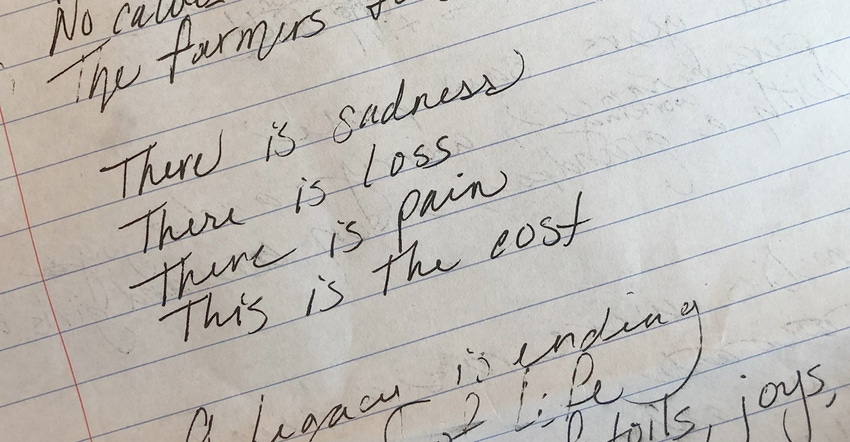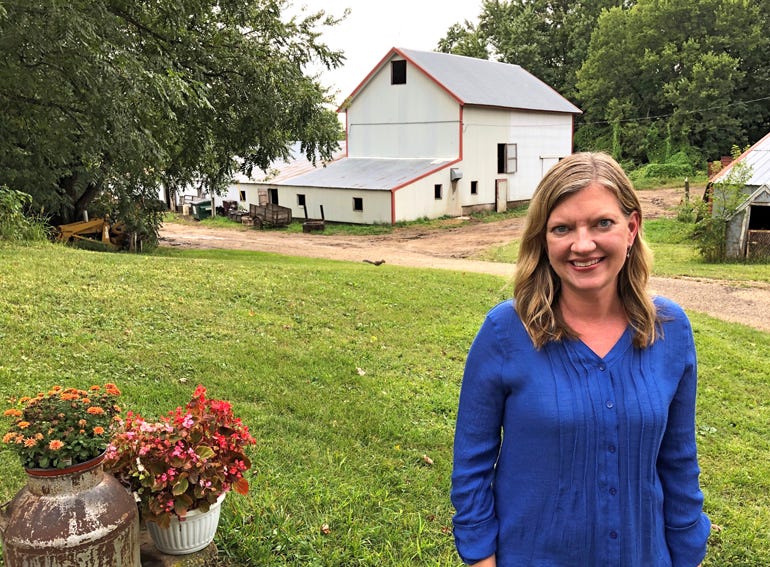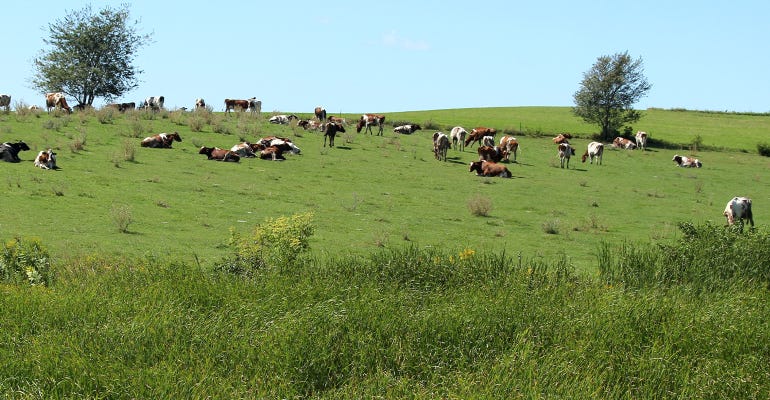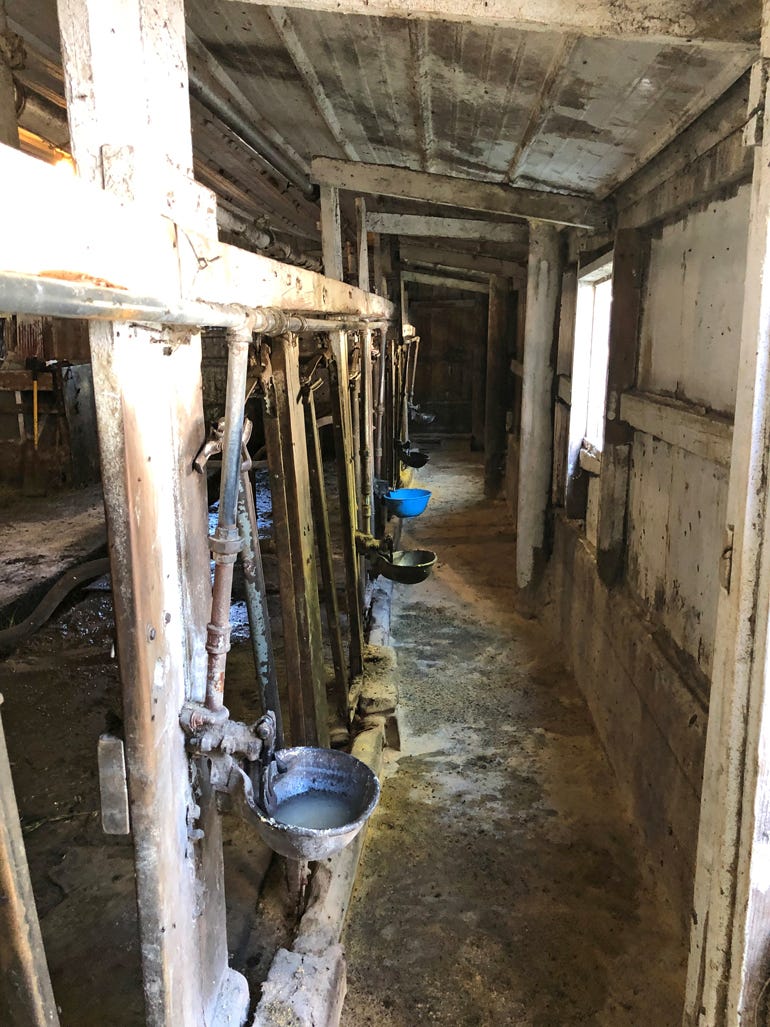
The tough calls had already been made when Carrie Larsen Ostman sat down with an urge to write.
Her family’s fourth-generation dairy farm bordering Rochester, Minn., near Oronoco was done milking cows. Circumstances over the last few years seemed to point them in that direction: Low milk prices, higher input costs, urban encroachment and the death of her father in 2018.
In two days, the livestock trucks would be hauling the herd to a Wisconsin auction.
So, on Sept. 2, Carrie took pen and paper in hand, sat on her bed, and let the emotion and words flow.
 FORMER DAIRY PRINCESS: Carrie Larsen Ostman represented Olmsted County as a former dairy princess. She continues to be active in local dairy promotion activities.
FORMER DAIRY PRINCESS: Carrie Larsen Ostman represented Olmsted County as a former dairy princess. She continues to be active in local dairy promotion activities.

Her writing took on rhyming and verse form, and ended up as a poem, which she finished writing on the morning the cows left. She shared it with family members as they stood near their empty barn.
Her brother, Chuck Larsen, passed it along to a farming friend. Carrie then decided to share it with others through social media. The poem, entitled “The Empty Barn,” struck a chord with many — farmers and non-farmers alike — who continue to offer positive, heart-felt responses. The Farmer read the poem in a Facebook post and reached out to Carrie for permission to share it. She kindly agreed, humbled by the request. She also shared more about her family’s farm and how the poem came to be.
The Larsen family story
Carrie’s parents, Jim and Judy Larsen, operated the dairy business with their oldest son, Lance, who also lives on the farm. They had a herd of 90 Red and White Holstein cows plus youngstock, and raise corn, hay and sweet corn. Lance’s daughter, Danielle, also worked on the farm, milking cows. Carrie lives in Rochester with her husband, Mark Ostman, and their four children. She works as a teacher. Her two other brothers, Chuck and Greg, and their families also assist on the farm and live and work off the farm.
In January 2018, Jim died after a brief battle with esophageal cancer. Since his illness progressed very quickly, Carrie said there were no plans in place for the dairy at the time of his passing.
Following her dad’s death, Carrie said her mom carefully considered how she wanted to proceed. This past spring, Judy told Lance that she intended to sell her portion of the herd by Labor Day. Lance eventually decided to sell his half of the herd, too.
“The poor milk prices, rising expenses, and the proximity of our farm to a larger city — a Menard’s store borders the barnyard — all factored into Lance’s decision,” Carrie said. “There were tough choices for everyone.”
As the final day of milking drew closer, Carrie kept thinking about the event that would forever change their lives.
“The words of this poem seemed to come from deep within my soul,” she said. After locating some loose-leaf paper in her son’s room, Carrie sat down on her bed and began scrawling away.
“I wrote the bulk of the poem on the morning I learned that the trucks had been scheduled and would begin to come for the herd in two short days,” she said. “Just hours before the final trailers were to arrive for the bulk of the milk herd, I finished up the poem, printed it and decided I would bring it to the farm to share with my mom and brothers when the barn was empty.”
 FINAL DAYS: The Larsen 90-cow red and white Holstein dairy herd is shown grazing pasture Sept. 3, a day before loading onto trucks for a Wisconsin livestock auction.
FINAL DAYS: The Larsen 90-cow red and white Holstein dairy herd is shown grazing pasture Sept. 3, a day before loading onto trucks for a Wisconsin livestock auction.

She brought copies to the barn for everyone, knowing she would have a difficult time reading it aloud. Her niece Danielle started to read it, but stopped, folded the paper in half, and said she’d finish it later. Others stood silent, reading the poem to themselves through tear-clouded eyes.
“We were all struggling with the finality of that moment,” Carrie said.
Life after the cows
As she grieves the loss of her family’s dairy, Carrie intentionally looks for the blessings and gifts in the pain. Numerous social media posts have buoyed her spirits. For the near future, the family will continue to raise crops. They will plow up pasture next spring to add acreage to the rotation.
Carrie said she is deeply grateful for her upbringing and proud of having served as an Olmsted County dairy princess some years ago. She will continue to serve on the county American Dairy Association board of directors, too.
 EMPTY STANCHIONS: Four generations of the Larsen family milked cows near Oronoco, Minn., in this 48-stanchion barn built about a century ago by relatives of Carrie’s grandmother. It was added onto several times over the years. The barn is empty now after the family sold their cattle.
EMPTY STANCHIONS: Four generations of the Larsen family milked cows near Oronoco, Minn., in this 48-stanchion barn built about a century ago by relatives of Carrie’s grandmother. It was added onto several times over the years. The barn is empty now after the family sold their cattle.

“I hope my poem sparks a connection to or compassion for our family farmers who are struggling right now,” Carrie said. The poem’s last stanza, she added, is intended to inspire farmers who are facing unfamiliar territory.
“I dedicate this poem to my parents, grandparents, brothers and all our families who have been blessed by life on the Larsen Farm,” she said. “I definitely feel I was raised up right as a farmer’s daughter — love and miss you, Dad!”
Read her poem in its entirety below:
The Empty Barn
By Carrie Larsen Ostman
The day the cows left the Larsen Farm, Sept. 4, 2019
The barn is now empty,
The stanchions don’t squeak,
No calves are lowing,
The family feels weak.
There is sadness,
There is loss,
There is pain,
This is the cost.
A legacy is ending,
A way of life,
An ending of toils, joys,
Successes and strife.
The sun sets in the pasture on this dairy farm.
Four generations have lived here,
Grown up, loved, learned,
And cried here in this family barn.
The markets bring changes,
Time doesn’t stand still,
From horses to Ford tractors
That have worked here to till.
If love for our herd
Were all to be considered,
There would be no arrangements
That would have to taste bitter.
Yet a decision today
Can never erase
The decades of memories
That linger all over this place.
From a surprise new baby calf,
To a fall into the manure,
Those were rites of passage,
We all did endure.
Families were raised here,
But we all must move on.
Nearly a century of working,
Close the gate when they’re gone.
Though the hurt is great today,
We will survive,
As the full cattle trailer
Pulls out of the drive.
For the years we did have,
We were blessed beyond measure.
To care for God’s critters,
With our loving hands we did savor.
We’ve welcomed new life into this world
With our bare hands.
And fallen to our knees in prayer
When one could not stand.
The sound of the milkers,
The rhythm of each day,
We’ll store up that memory,
Like we’ve stored milk, grain and hay.
Goodbye sweet cows,
We are grateful for you,
For the work you provided
And for the love, too.
To our industry,
Our fellow farmers,
We’ll cheer you on loudly—
That you’ll grow and prosper.
For it’s the faithful hearts of the farmers,
and our families, too,
Who have stayed up all night
with worry for what to do.
We forever farmers will greet a new sunrise,
Dusting dirt off our boots, full of pride, standing tall.
Showing learned perseverance to begin the next chapter,
Moving forward with grace, in spite of it all.
About the Author(s)
You May Also Like






